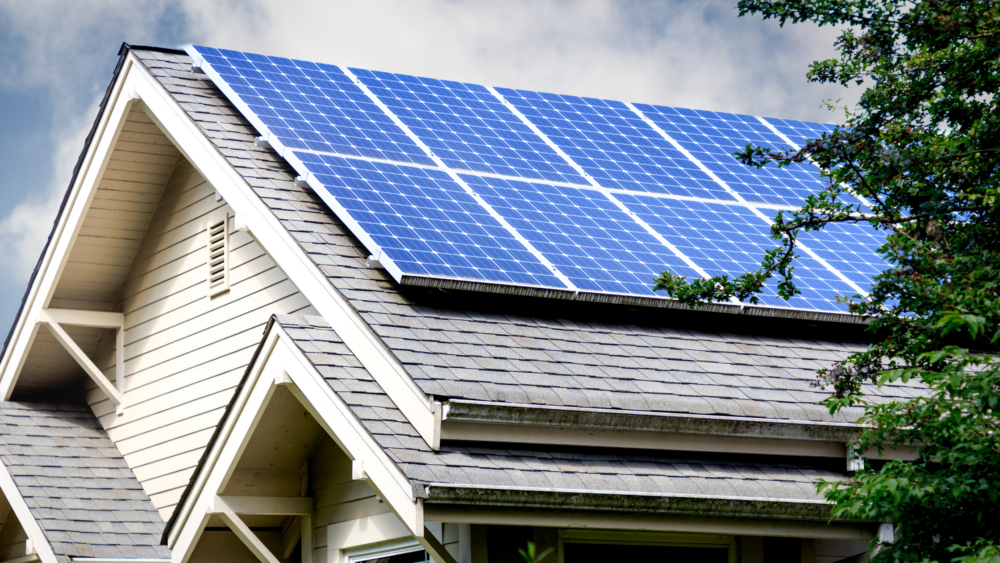Imagine, just for a moment, the freedom of harnessing your own power from nature’s grandest source – the sun. I know what you’re thinking: “That sounds great, but how much will it cost?” That’s where our Solar Install Cost Calculator comes into play.
The journey to solar energy can feel like stepping into uncharted territory. You might be feeling overwhelmed with questions about costs and potential savings. Trust me; we’ve all been there.
This guide is here to light your path towards understanding how different factors such as property location, system size or even type of panels can affect installation costs. But more than that – we’ll reveal ways on how you could maximize your savings through various strategies and incentives!
This guide will provide an opportunity to assess the cost-effectiveness of various solar panel options. We’ll focus on cost-efficiency and more.
Understanding Solar Install Cost Calculator
The world of solar energy can seem daunting at first, but tools like a Solar Install Cost Calculator are here to simplify things. This handy tool helps homeowners get an estimate of the cost involved in solar panel installation.
Different factors such as property location and system size contribute significantly to the overall costs. The type of your chosen solar panel system, whether it’s off-grid or grid-tied, also affects the price tag.
The good news is that financial help isn’t too far away either. Did you know about the federal solar tax credit (ITC)? It’s been extended multiple times already and is set to expire only in 2032. So yes, Uncle Sam does want you to go green.
Your Home: A Powerhouse?
A critical question many people ask when considering going solar is – “Will my home produce enough power?” With our calculator, this mystery gets solved easily. You can use average monthly electricity rates from your utility bills for accurate results.
Potential Savings: Not Just Small Change.
You’re not just saving on electricity costs with solar panels; think bigger – much bigger. Use our calculator for an insight into potential savings over time with different financing options like cash purchase or loan payment plans. Solar loans, for instance, offer low-interest rates and zero-down-payment options that let you start saving right away.
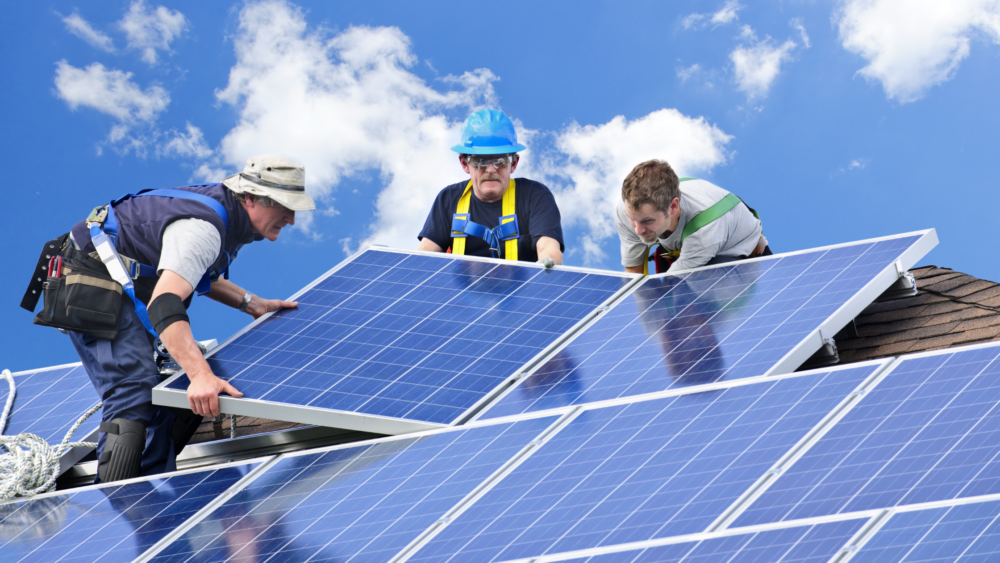
Factors Affecting Solar Install Cost
Your solar panel system’s cost is influenced by several factors, with property location and system size taking center stage. Let’s explore these components further.
Property Location and System Size
The geographical location of your property plays a significant role in the cost of installing solar panels. Some regions have more sun exposure than others, affecting the type of solar equipment you’ll need for maximum efficiency. Additionally, local utility rates can affect your potential savings from going off-grid.
A larger home will likely need a bigger solar panel system to cover its energy needs which could increase costs. However, it’s not just about size; the orientation and tilt angle of your roof also matter when considering installation costs.
Different Types Of Systems
You also need to think about if you’d prefer a system that’s connected or not linked to the public power grid. Grid-tie systems connect directly to the public utility grid – they are generally cheaper but depend on external power sources during outages unless coupled with battery backup power.
In contrast, off-grid systems operate independently from the utility grid but require additional components like batteries and charge controllers making them typically pricier initially. Yet over time they may save money due to decreased reliance on rising electricity rates provided by utilities.
Studies show that investing in any type of quality renewable energy solution adds value to homes as buyers recognize lower long-term electricity costs. So, when it comes to solar panel installation, knowledge is power – and potential savings.
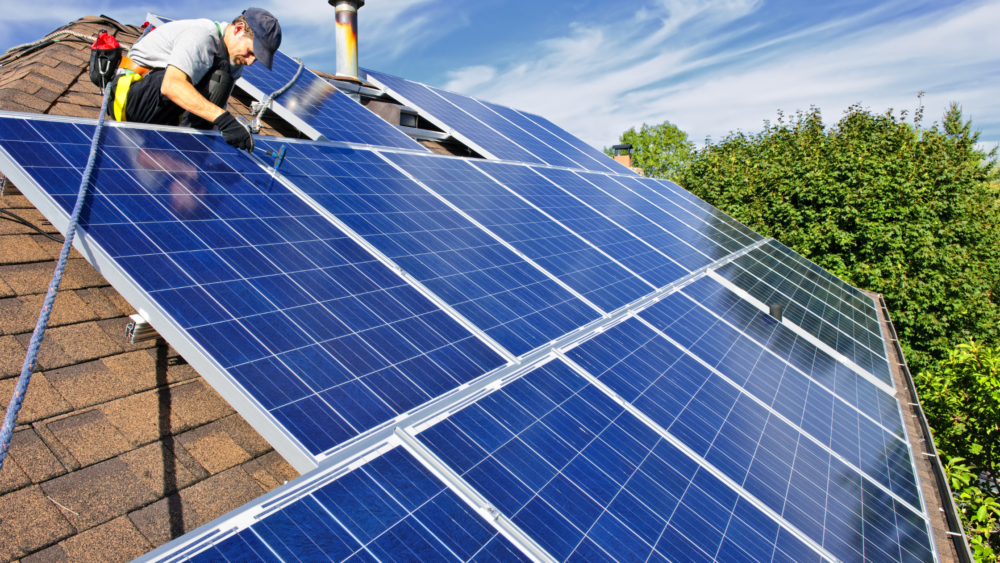
Calculating Your Potential Savings with a Solar Install Cost Calculator
If you’re considering going solar, knowing how to estimate your potential savings is crucial. One way to do this is by using a solar install cost calculator.
This tool gives an approximation of the total upfront cost involved in setting up solar panels on your property and compares it against your average monthly electricity costs.
Federal Tax Credit Consideration
A significant factor that can drastically reduce these upfront costs is the federal tax credit for solar installation. It’s not uncommon for homeowners to see their initial investment decrease significantly thanks to this benefit.
The Role of Solar Loan Payments
In addition, if you decide not to pay cash outright but instead opt for a solar loan, understanding your potential loan payment amount becomes important too. This helps ensure that what you’ll be spending on repayments doesn’t exceed what you would have spent on conventional power supply each month.
Fun fact: Did you know? A cash purchase usually offers the highest return on investment and most energy savings over time when installing solar panels.
Taking Advantage of Free Tools Online
To help make sense of all these factors together – total cost, possible tax credits, and estimated loan payments – online calculators come in handy. They allow us to put all these numbers into perspective easily so we can determine whether or not investing in renewable energy makes financial sense.
Financing Options for Your Solar Installation
The journey to a greener future starts with understanding your options. For homeowners considering solar, the financial aspect is often top of mind. But don’t fret. Don’t worry, there are numerous ways to make solar power more affordable.
Solar Loans: Buy Now, Pay Later
A popular option is a solar loan payment plan. These plans let you pay for your system in manageable installments over time, sometimes even without needing money down upfront. They offer low-interest rates and long repayment periods making them an attractive choice for many homeowners.
Federal Tax Credit: Uncle Sam’s Helping Hand
The Federal Solar Tax Credit provides an attractive incentive for homeowners looking to install solar, with substantial savings available until 2032. This credit has been extended multiple times and will remain available until 2032.
Solar Leases and Power Purchase Agreements (PPAs)
If owning isn’t right for you yet, consider a solar lease or power purchase agreement (PPA). Both options involve partnering with companies that own and maintain the panels while offering electricity at lower-than-usual rates – win-win.
Bonus Tip:
- To ensure maximum savings from any financing method chosen, remember this golden rule – The quicker you pay off your solar loan or lease agreement, the more energy cost-saving benefits you’ll reap in return.
Remember that different financing methods suit various situations better than others do, so weigh all these factors carefully before making your decision.
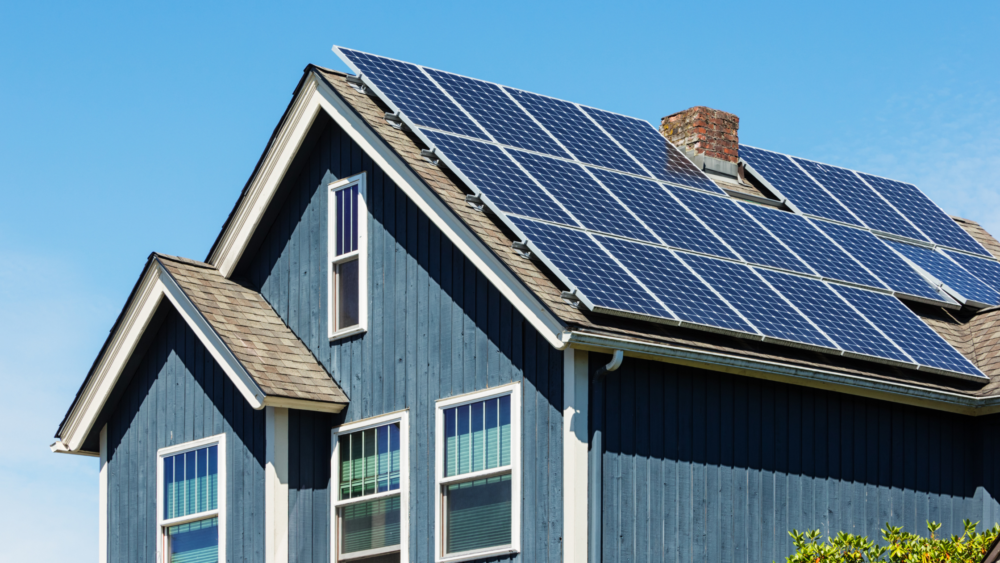
Maximizing Your Solar Savings
If you’re serious about squeezing the most out of your solar panel system, then buckle up. We’re going on a ride to help you unlock the full potential of renewable energy savings.
Net metering is a great place to start. It lets you sell any excess electricity generated by your panels back to the utility grid, offsetting costs and boosting savings. But don’t stop there; take advantage of varying electricity rates throughout the day too. By utilizing power during periods of low rates, you can get more bang for your buck.
Battery storage also plays a vital role in this journey. With it, surplus energy produced during peak sunlight hours isn’t wasted but stored for later use or sold back into the grid at higher prices – ka-ching.
The Impact Of Energy Storage On Solar Savings
You might be thinking: “Battery storage? That sounds expensive.” Yes, there’s an upfront cost involved with batteries like Tesla’s Powerwall or LG Chem’s RESU10H but consider their long-term benefits.
Energy storage systems let us harness our solar panels’ full potential because they store excess power we produce for times when sunshine is scarce (like cloudy days and nights). Plus, remember that selling-back bit? Storing excess energy means we have more control over when we sell it back—typically at peak demand periods when prices are highest—which helps us maximize profits from our solar investment.
Owning vs Leasing: The Final Showdown
Last but not least: ownership matters. Owning your own system almost always offers bigger returns over time compared to leasing arrangements. Installing a solar system could not only reduce your electricity bill but also boost the value of your home. The savings just keep rolling in.
So there you have it. A few simple strategies to help maximize those sunny day dividends.
Comparing Different Solar Panel Options
Not all solar panel systems are the same; thus, it is important to compare them in terms of cost and power output when considering harnessing the sun’s energy. Differences in cost and power output make comparing different solar panel systems essential for anyone looking to harness the sun’s energy.
Evaluating Cost-Per-Watt
The first step in comparison is understanding how much electricity each panel can generate. Divide the cost of each panel by its power output to get a ratio that measures the value of your solar investment – cost-per-watt. The lower this number, the better deal you’re getting on your solar investment.
This doesn’t mean that cheaper panels always offer more value though. High-quality panels might have higher upfront costs but could produce more electricity over their lifespan – giving them a lower overall cost-per-watt.
Panels Generate Differently
Different types of solar panels also perform differently under varying conditions. For example, monocrystalline silicon (mono-Si) panels work well even when sunlight isn’t at its peak whereas polycrystalline silicon (poly-Si) models excel during optimal sunshine hours.
If your location experiences diverse weather patterns or if parts of your roof remain shaded throughout part of the day – considering these factors can help determine which type will give you maximum efficiency and savings.
Selecting What Works Best For You
Solar Panel Inventory
With our handy guide now at hand, picking out what works best for your home should be less daunting. Just remember: it’s about balancing costs with expected performance and long-term returns.
Examine various possibilities in terms of their Cost-Per-Watt rating and how they act under diverse circumstances. It’s all about finding the perfect fit for your unique energy needs.
Choosing the Right Solar Install Company
Searching for a dependable solar installation firm can seem like searching for a needle in a stack of straw. But, don’t worry. Don’t fret – we’ve got some advice to help you make your way through the multitude of choices.
The first step is understanding what different companies offer. Some might give an attractive solar lease while others may provide comprehensive financing options that fit your budget better. It’s important to weigh these offerings carefully before making a decision.
Another crucial factor is the type of solar systems each company specializes in. Not all systems are created equal – from off-grid setups designed for self-sufficiency, to grid-tied configurations meant to offset utility costs; there’s plenty to consider.
Consider Solar Incentives and Financing Options
Solar incentives offered by both federal and state governments could significantly reduce your initial outlay on installing panels at home. Companies should be well-versed with such programs and guide you on how best you can benefit from them.
Besides cash purchases, other popular financing methods include loans or leases provided by most solar install companies. A reputable company will transparently discuss their terms including interest rates and repayment schedules allowing you decide which method works best for you.
Evaluating Reputation And Quality Of Service
A quality installer not only has extensive experience but also boasts positive customer reviews that attest their professionalism and high-quality service delivery. Examining various companies’ appraisals, evaluations, and endorsements can give you an understanding of their standing.
Remember, going solar is a significant investment. Be sure to pick wisely, for the proper company will guarantee that your system runs smoothly and yields the most savings in time.
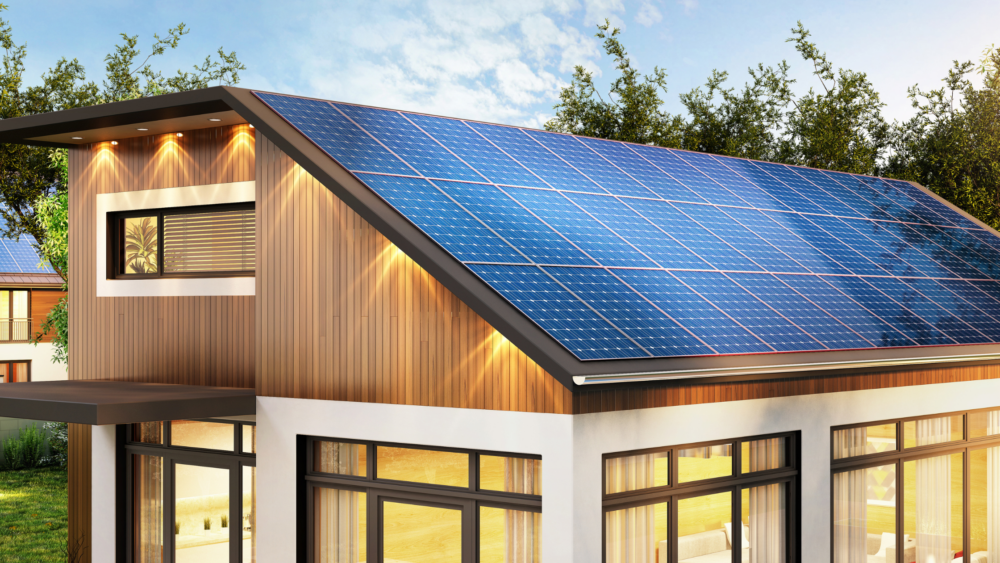
Exploring the Benefits of Solar Installation
The perks of installing solar panel systems extend beyond just saving money. Sure, cutting down on your electricity bills is a major draw for many homeowners. But have you ever thought about how going solar could help save energy and contribute to renewable energy efforts?
Solar panels are not just eco-friendly; they’re homeowner friendly too. By using sunlight – an abundant and free resource – these green machines can drastically reduce or even eliminate your monthly electricity costs.
Surprisingly, there are more advantages to solar panels than initially thought. For instance, did you know that homes with solar installations tend to see increased property value? This might come as a surprise, but think about it: if you were house hunting, wouldn’t a home equipped with cost-saving solar technology stand out?
Grid-tie Solar Kits, which allow your system to connect directly into the utility grid, provide another key benefit. If your panels produce more power than what’s needed in-house during peak sun hours (usually midday), excess power gets sent back into the grid.
This means two things: firstly, you’ve got backup power for those rainy days (literally). Secondly? In some cases where net metering policies exist—you get credit from your utility company for feeding extra juice back into their lines.
All this sounds pretty sweet right? Well hold onto your hats because we haven’t even touched on federal tax credits yet…
Understanding The Process of Solar Installation
The journey to harnessing solar energy at your home begins with a clear understanding of the installation process. Having a good grasp of the process allows you to plan ahead and make the most out of your solar installation.
Initial Consultation and Site Evaluation
Your first step towards going green with solar is scheduling an initial consultation. During this meeting, the solar company evaluates your property for suitability and determines how many panels you’ll need based on your average monthly electricity consumption.
Solar System Design and Approval
After evaluating your needs, professionals design a custom panel system that fits within local regulations while maximizing power production. Once approved by local authorities, they can move forward with installing these solar panels.
Solar Panel Installation
The actual installation phase involves mounting solar panels typically on rooftops or in other suitable locations around the property. Installers connect each panel together forming one big network linked to your home’s electrical system.
Fine-tuning And Inspection
Last comes fine-tuning everything for optimal performance before having an inspection done by either state representatives or third-party inspectors – ensuring all systems are go.
Remember that professional installers make sure every aspect aligns perfectly so that you get maximum benefits from sunlight hitting those shiny new cells.
Exploring Considerations Before Installing A Solar System
Before beginning your solar installation, it is important to contemplate the cost of the system and assess the condition of your roof. These include the cost of solar installation and understanding the condition of your roof.
Solar Panel Cost
The initial upfront cost can seem steep, but don’t let that deter you. With an array of financing options available, installing panels becomes affordable for many homeowners. Plus, remember the federal tax credit, which significantly lowers the overall expenditure.
Rooftop Condition and Space Availability
Your roof’s health plays a crucial role in panel installation – it needs to be sturdy enough to support them. Also consider if there’s ample space for optimal energy generation without obstruction from trees or buildings nearby.
Local Regulations and Permissions
Some areas have specific regulations regarding solar installations – ensure compliance with local codes before proceeding. It might also be necessary to get permissions from homeowner associations (HOAs) or other regulatory bodies.
Determining Energy Needs
To decide what type and size of system will best suit your needs, take stock of your average monthly electricity costs and consumption patterns. This will help guide you towards more efficient usage post-installation as well. Off-grid solar systems, while initially more expensive than grid-tied ones, offer greater long-term savings by eliminating utility rates altogether. This is where our handy solar install cost calculator comes into play – making these calculations simpler.
FAQs in Relation to Solar Install Cost Calculator
How much solar panels do you need for a 2000 square foot house?
A typical 2000 sq ft home may require around a 6kW to 8kW solar system, depending on the location and energy usage.
How do you calculate the cost of a solar system?
To estimate the cost, multiply your electricity consumption (in kWh) by the rate per watt. Then factor in potential savings from tax credits or incentives.
How much should a 10kw solar system cost?
The average price range is $15,000-$25,000 before tax credits. The final cost can vary based on factors like equipment and installation charges.
How long does it take for solar to pay off?
Solar systems typically break even within seven to ten years but could be faster with incentives or higher utility rates.
Conclusion
So, you’ve journeyed through the realm of solar installation costs. Now you’re equipped with a greater understanding of how to navigate your potential savings using our Solar Install Cost Calculator.
Remember that property location and system size are key factors influencing overall cost. It’s also crucial to keep in mind different financing options for maximizing your savings.
You’ve seen that comparing panels based on their cost-per-watt can help choose the right one for your needs. And let’s not forget about selecting a reliable install company – it matters!
The power is now in your hands (literally!). So go ahead, take control of your energy needs while contributing towards renewable efforts! Your sunny future awaits!
No Hassle Estimates
We have a nationwide network of the best local contractors ready to quote your solar project. Get estimates on solar HERE.


